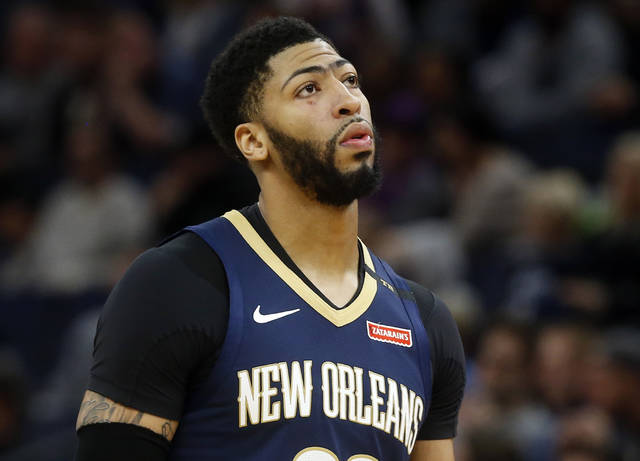Anthony Davis’ trade request was the decent thing to do

By DERON SNYDER (as published in The Washington Times)
With nearly a fifth of the century behind us, traditionalists in sports are having a rough ride. Every other day seems to bring another athlete who’s flexing his leverage, taking control of his destiny, or running his mouth on race and politics.
Not that trade requests or forays into real-life issues never happened in the good ol’ days when management’s iron fist was rarely unballed.
Ted Williams used his Hall of Fame speech in 1966 to call out Major League Baseball for black players’ absence from Cooperstown. Kareem Abdul-Jabbar told the Milwaukee Bucks in 1974 that the city wasn’t a good fit and he wanted out. John Elway warned the Baltimore Colts prior to the 1983 draft that they shouldn’t select him because he’d never play for them.
But those instances occurred in an era without social media and the 24-hour news cycle serving as twin bullhorns. The ability to amplify their positions seemingly has emboldened some athletes. And their willingness to take a stand – instead of sitting down and staying silent – is tough to stomach for some old-timers.
Their indigestion is laughable. They have no problem with pro sports being a business, as long as labor remains subservient. But when an athlete exerts his power or exercises his rights, they want him to focus on the game and his team.
No, I don’t feel sorry for traditionalists and their angst.
They should put themselves in, say, Anthony Davis’ position.
Davis is making $25 million in New Orleans, but New Orleans isn’t making him happy. Neither is the money, which can purchase anything except contentment. He’s among the league’s Top 10 players but the Pelicans are headed to the lottery for the fifth time in his seven seasons. Under contract through the end of next season, Davis has informed them that an extension isn’t happening and he’s requesting a trade.
“He wants to be traded to a team that allows him a chance to win consistently and compete for a championship,” agent Rich Paul told ESPN Monday, a statement that earned his client a $50,000 fine from the NBA.
The penalty was for Paul going public, not for the request itself. You can’t punish a player for wanting something. You can’t necessarily blame him, either.
I find it irritating when folks say Davis “demanded” a trade, as if he walked into the front office waving a gun. No team is forced to trade a disgruntled player, though it’s usually in the team’s best interest when the alternative is receiving nothing when his contract expires.
In the end, Davis’ reasons for wanting out are irrelevant. Maybe the food in New Orleans is too rich. Maybe he had a bad breakup and the city reminds him of the old girlfriend. Maybe the Chicago native simply would rather be in Los Angeles or another mega-market.
Telling your team that you have no intention of staying is actually the decent thing to do. It gives the franchise an opportunity to acquire some assets as you depart. The old team rarely receives equal value when shipping off a superstar, but sometimes the deal works out fine, like when Indiana sent Paul George to Oklahoma City for Victor Oladipo and Domantas Sabonis.
It’s a tough lesson for fans in New Orleans, especially youngsters who might sleep in a Davis jersey with a Davis poster over their bed. It can be a blow to residents’ civic pride when their city is deemed undesirable by a luminary. “What’s wrong with us?” they might wonder.
Nothing’s wrong with New Orleans or any other mid-sized market. But even if a franchise boasts excellent management – which the Pelicans clearly do not – the lifestyle isn’t for everyone.
Some stars ultimately are drawn to bigger stages and brighter lights.
They’re also drawn to title chases. When a player’s franchise proves to be inept AND in a location that doesn’t grab him, that’s a tough combination to overcome. Better to go somewhere you’d rather be (presumably a desirable outpost to others, too), to increase your happiness and odds of contending.
Davis doesn’t owe anyone an apology for wanting out. At the very least, he was going to leave via free agency in 2020. All he did was share his intentions with the Pelicans and other NBA teams, giving everyone a heads up.
Teams usually make the first move, letting competitors know when certain players are available via trade. Traditionalists don’t have a problem with that arrangement, even when said players love their city and franchise.
Despite cases of big-name stars like George and Kyrie Irving being dealt when their teams preferred to keep them, the balance of power still rests comfortably on management’s side.
But more and more, with select players, shifts happen. Fans who are bothered by that fact need to get over it.
We’re not living in the ‘60s anymore.
— Brooklyn-born and Howard-educated, Deron Snyder writes his award-winning column for The Washington Times on Tuesdays and Thursdays. Follow him on Twitter @DeronSnyder.
 Follow
Follow
